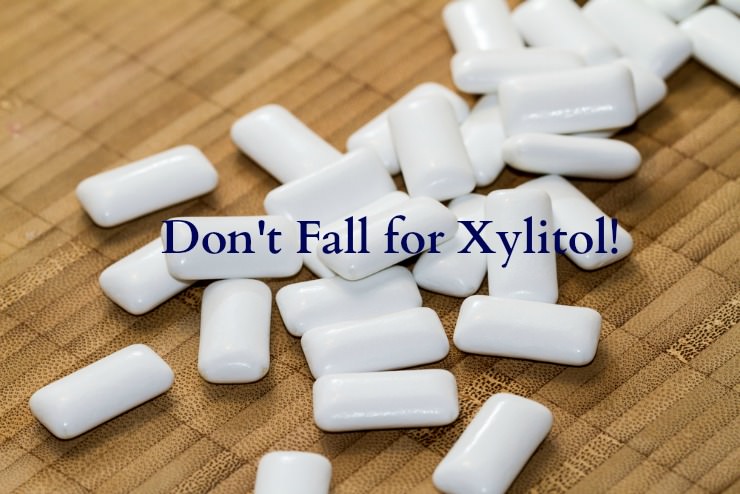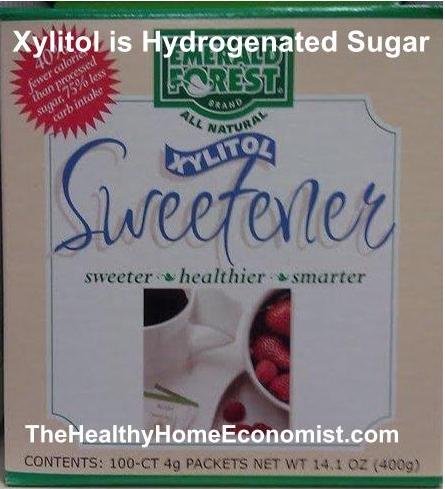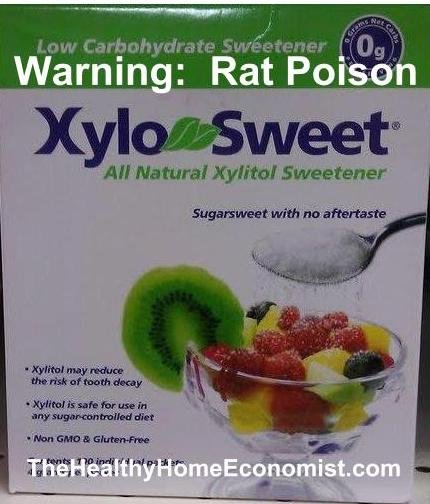
Xylitol is truly the darling of sugar substitutes today. The American Dietetic Association touts its use, with this sugar alcohol sold alone and as a sweetener in a variety of processed foods. Health benefits include a reduced glycemic response compared with sucrose, increased absorption of B vitamins and calcium, and even a reduction in dental caries risk.
Consequently, people with blood sugar issues are flocking to processed foods containing this alternative sweetener as a way to satisfy that sweet tooth without the downside of exacerbating the risk factors for Metabolic Syndrome. This condition is known for the markedly increased likelihood of developing heart disease, stroke, and type 2 diabetes.
Even the healthfood community almost universally considers this sugar alcohol to be a healthy substitute for sugar. A primary reason is that it doesn’t directly contribute toward the growth of intestinal yeasts aka Candida.
Have you noticed that the check out aisles at health food stores are typically loaded with chocolates and other sweets containing at least some xylitol? The truth is that I have yet to talk with any health-conscious person who suggests to me any downside other than the potential for intestinal cramps if you get too much.
Xylitol is Naturally Found in Nature
Xylitol is, after all, a naturally occurring substance. Manufacturers of xylitol market it as derived from xylan. The fibers of many plants contain it, including berries, oats, beets, sugar cane and birch. Sounds pretty harmless at first glance.
The FDA has even granted xylitol GRAS (Generally Recognized As Safe) status. You can’t get any safer than that, right?
 Manufacturing Process
Manufacturing Process
It is true that xylitol is a naturally occurring substance. However, manufactured xylitol is another matter entirely. Food manufacturers produce it using the industrialized process of sugar hydrogenation. In order to hydrogenate anything, a catalyst is needed. In this case, Raney nickel is used which is a powdered nickel-aluminum alloy. (1, 2)
This poses the risk of heavy metal residue and contamination. Nickel, by the way, is a recognized carcinogen and aluminum is associated with the development of dementia. Heavy metals in the body are notoriously difficult to eliminate with frequent use of infrared sauna probably a good idea.
This alternative sweetener doesn’t seem quite so warm and fuzzy anymore, does it?
There is currently no literature on any detrimental health effects of consuming hydrogenated sugar. However, food manufacturers widely used hydrogenated fats for decades before the very damaging effects of cardiovascular health became widely known!
Given the violent industrialized process that is required to produce a hydrogenated sugar like xylitol, it would seem wise to avoid it based on the very poor track record of hydrogenated foods in general.
Most Xylitol Sourced from GMO Corn
While it is true that xylitol can be derived from the xylan of birch trees, xylan is also found in corn cobs. It is much cheaper to use corn instead of birch bark to derive xylitol and so what do you think manufacturers prefer? Corn, of course.
Therefore, unless the label of a xylitol-containing product specifically notes that it is from birch or another nonGMO source, xylitol is very likely from genetically modified corn or possibly GMO sugar beets.
This is the same problem as high fructose corn syrup (HFCS) and white sugar from beets. Food manufacturers rely heavily on these sweeteners in the production of sodas and sports drinks.
You get a dose of GMOs with every sip! More on GMO dangers including sterility and stomach holes at the provided link.
Usage Contributes to Gut Imbalance
The digestive process does not break down sugar alcohols like food. Rather, xylitol arrives intact into the intestines.
At that point, a process called “passive diffusion” takes place. This means that the xylitol draws water into the bowels. Only a partial breakdown is the end result. The unmetabolized portion ferments providing the perfect environment for undesirable bacteria to thrive and grow.
It is true that xylitol itself does not feed candida directly as sugar does. As a result, this artificial sweetener is even promoted as a useful part of the Candida Diet. Unfortunately, the fermentation of undigested xylitol in the gut most definitely can exacerbate yeast problems. Don’t be fooled by this argument!
This is exactly why consuming xylitol can make some folks so gassy and even trigger cramping and diarrhea. Gut pathogens having a heyday in your intestines give off a lot of smelly toxins!
Other Little Known Problems
Xylitol can contribute to acid reflux problems. As a result, those who have issues in this area should avoid it for that reason alone. Chronic acid reflux is a serious problem that can lead to cancer of the esophagus and larynx.
In addition, those who suffer from seizures of any kind should stay away from this alternative sweetener as it can increase the frequency of epileptic attacks.
Two Pieces of Xylitol Gum Can Kill a Rat?
According to unpublished lab tests, approximately 1.65 grams of xylitol kills a 100-gram rat half the time.
Two little pieces of xylitol gum contain about .7 – 1 gram. This is probably enough to meet the definition of rat poison.

Cavity Prevention
Many people are chewing xylitol gum due to compelling scientific evidence for cavity prevention. What about children, however?
Rami Nagel, author of Cure Tooth Decay, doesn’t even recommend xylitol gum for this purpose. His research for any long term safety data turned up the following:
- Epidemiology: No information found
- Teratogenicity: No information found
- Reproductive Effects: No information found
- Mutagenicity: No information found
- Neurotoxicity: No information found
In summary, using this modern substance officially renders you a guinea pig, my friend! It seems that any benefits of cavity prevention are outweighed by the fact that there is no actual safety data backing up its use.
Safe Uses of Xylitol
Given all the problems that consumption of xylitol can trigger, it seems best to bypass the use of this sugar substitute on a regular basis.
Can it ever be helpful? Does it have any benefits whatsoever?
Potentially so. The only time I personally would ever consider using xylitol is to help resolve a childhood ear or sinus infection in order to prevent the use of drug-based antibiotics.
There is evidence that this popular sugar alcohol can indeed help encourage a healthy balance of beneficial bacteria found in the ear canal and sinus cavities. Products like this incorporate xylitol for this purpose.
A therapeutic dose can help resolve infection in these areas quickly with no medication required.
Thus, if you choose to use it, make sure it is sparingly and therapeutically (not as food). Also, make sure it does not come from a GMO source like corn!
References
(1) Xylitol production via catalytic hydrogenation of sugarcane
(2) Catalytic hydrogenation of xylose to xylitol using ruthenium catalyst on NiO modified TiO2 support
(3) Cure Tooth Decay by Rami Nagel
(4) Sugar-Free Blues: Everything You Wanted to Know about Artificial Sweeteners
More Information
Yacon: Healthy Syrup or Healthfood Hype?
Jaggery: India’s Sweet Gift








There has been world wide research on the positive effects of xylitol. As far as production is concerned there is a new electrolytic process that can convert corn products to xylitol in its purest form. Keep in mind that the present hydrogenation from birch bark process is not particularly environmentally friendly and the yield ratio is basically poor. Once this process is commercially available the cost of production will be substantially reduced.
Well, I’m sticking with xylitol.
Sorbitol (which is in everything from toothpaste to medication to candy to imitation crab meat) makes me incredibly ill. Stevia gives me migraines. Splenda, nutrasweet- all of the other fake sugars I have tried have given me either severe headaches or terrible stomach issues.
Enter xylitol. No problems with it to speak of for me. As someone who is amazingly sensitive to fake sugars, I have been blessed by xylitol. It’s my only option for gum, since even most non-sugarfree gums contain fake sugars as well. At least now I can find gum with xylitol (and no other crap that makes me sick and miserable) and that’s priceless for me.
ee, I just googled this now after having one too many pieces of gum! One piece of xylitol gum doesn’t hurt me, but boy after 4-5 pieces I have wild heartburn right now!
i use birch xylitol made in the USA, never corn xylitol. I have about 2 tablespoons per day in my tea and / or coffee. I have been doing this for well over 4 years. I started using it because Splenda was my go to sweetener and I started having ringing in my ears as well has redness across the middle of face, both subsided after stopping Splenda. But, the best news is I have not had one single cavity since starting the xylitol !!! My dentist always comments that my teeth are strong and I have very little build up of plaque between cleanings. My oral habits have remained unchanged , other than adding xylitol. It did take a bit of time to work up to the amount I use, as it will cause some gastric upset if too much is taken too soon. No problems now, I am happy and will continue to use it. ( as others have mentioned please keep it away from dogs)
I have used xylitol in sauces, toothpaste, mouthwash, gum and baked products. I only use non-GMO from hardwood trees sourced in the us. I’ve never had a problem with posted side effects. Do your own research.
What about using xylitol in mouthwash to prevent cavities and help gum disease? That is what I hve been using it for. Not sure if that is considered safe due to the fact that it’s spit out after?
I suspect the same, Michael. But where I live, Xylitol from birch seems to be the only kind I seem to find.
Namaste and care,
mhikl
I have used Xylitol for years, but for a while now, only for brushing my teeth, mixed it with Borax powder; both have been shown to strengthen bones, and according to my dentist I have ‘extremely strong bones’. He was quite amazed at an appointment to check a severe tooth ache. I asked him if he meant ‘strong for my age’; I was sixty-four. He barked back, “No! For any age!”.
• It has to be the Borax more than the Xylitol. Google Walter Last’s article “The Borax Conspiracy”. It is most interesting. More has been coming out on the health benefits of Boron from Borax the past year or so. Here is one of Last’s site: health-science-spirit.com/borax.htm It is often copied on other health sites as well.
• Lately I have been having trouble with phlegm build-up in my mouth and finally decided to begin taking Xylitol in my tea and a tsp or so a few times a day to chew on. I usually do not like sweet things. Within a day, the phlegm in my mouth was much decreased; it has been five days and I don’t notice the phlegm now. What I suspect is that Xylitol also works in the body to combat phlegm. Maybe that is why the body naturally produces some Xylitol.
• I shall be more vigilant with my Xylitol use and shall continue using a quarter to a half tsp of Borax a day, as well. Most people think that Borax is a poison, and it does say on the box that if swallowed to call the poison centre and not to get it in the eyes. Yet I was taking a teaspoon every four hours beginning 13 months after the root canal I mentioned. The root canal had not worked out properly (second time this has happened to me); and the borax stayed the pain for almost exactly 4 hours; then it would return fast and painfully, so I would then take another tsp. I did this for 4 months (it took 3 months to stop the pain from returning and then I did one extra month for good measure). I was taking the tsp about 5 times a day. It has been about nine months now and the pain has not returned. I really did not want to go through a second root canal and its costs. I wonder if Borax could help children’s teeth and reduce dentist visits severely.
• I am now using both a Xylitol drop mixture and Borax drops to clear my eyes in the morning and before bed; they are in separate small squeeze bottles. I also use the Borax drops in my dog’s eyes as they constantly get gunk build up. She is not bothered by the drops at all; and of course, I do not use Xylitol on her as it is dangerous for dogs.
• Xylitol and Borax are the only things that help stop eye itch for me. And the Xylitol also put an end to my itchy eyebrows. Nothing else ever worked for the dreaded ‘Eye Brow’ itch. And the ‘extremely strong bones’ ‘for any age’ was the assurance I needed that the Borax does strengthen bones. I’ve been using Borax internally for nearing ten years.
Namaste and care,
mhikl
I have just started using Xylitol (from Birch) and my gums improved overnight! I stopped craving carbs due to my pcos. On my walk I noticed my sinus cleared dramatically, it is such a relief when that happens and the scar that seems to take forever to clear after a pimple is disappearing. The glands in my neck have also reduced to nearly normal. I eat healthy and I exercise, but still I have been plagued by these problems which the Xylitol has begun to sort out for me. I figure I must have a bacteria that is beginning to die off as the Xylitol works its magic. Nothing else, including Kefir, has accomplished this. Yes, I am happy with it.
In my case Xylitol definitely causes headaches. I’ve narrowed it down and it proves itself over and over. If you have some throw it in the trash. It’s not worth it.